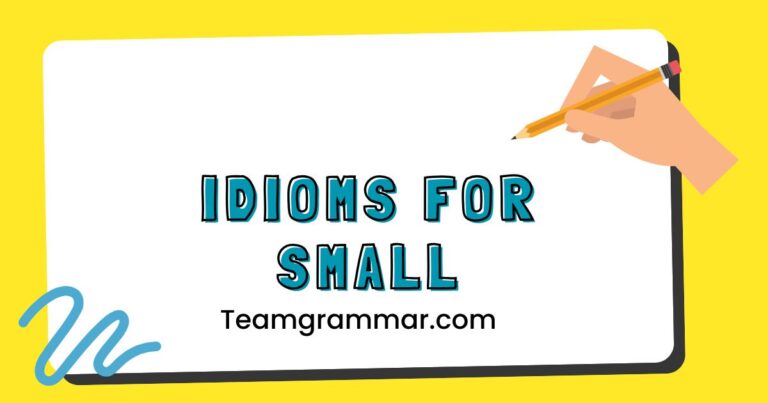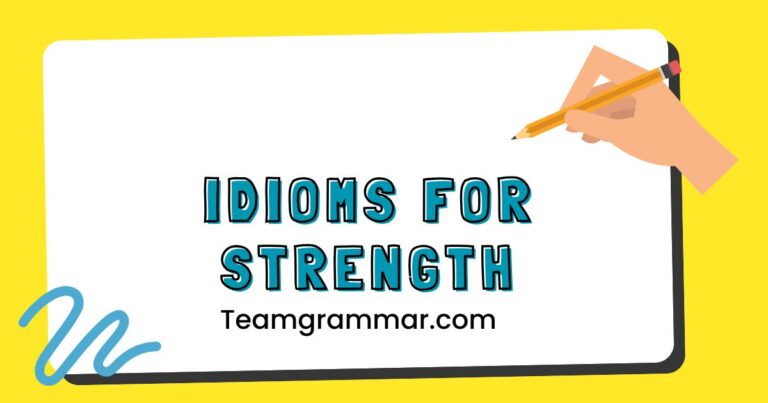47 Idioms for Marriage: Enrich Your Vocabulary
Marriage is a significant life event, rich with traditions, emotions, and shared experiences. Expressing the nuances of this journey often requires more than just literal language.
Idioms, with their colorful and figurative meanings, provide a powerful way to convey the complexities and subtleties of marital life. Understanding idioms related to marriage enhances your comprehension of English and allows you to communicate more effectively and expressively.
This article caters to English language learners, native speakers looking to refine their vocabulary, and anyone fascinated by the cultural expressions surrounding marriage.
Table of Contents
- Introduction
- Definition of Idioms for Marriage
- Structural Breakdown
- Types and Categories of Marriage Idioms
- Examples of Marriage Idioms
- Usage Rules for Marriage Idioms
- Common Mistakes with Marriage Idioms
- Practice Exercises
- Advanced Topics
- Frequently Asked Questions (FAQ)
- Conclusion
Definition of Idioms for Marriage
Idioms are phrases or expressions whose meanings cannot be understood from the literal definitions of the individual words. Instead, they have a figurative meaning that is culturally specific.
When we talk about “idioms for marriage,” we refer to expressions that relate to aspects of married life, such as commitment, partnership, challenges, and celebrations. These idioms often provide insights into cultural perceptions and expectations surrounding marriage.
Understanding these idioms requires familiarity with the cultural context in which they are used. For instance, an idiom that emphasizes the difficulties of marriage might reflect a society where marital challenges are openly acknowledged, while an idiom that romanticizes marriage might come from a culture that idealizes the institution.
Therefore, learning these idioms not only enhances linguistic skills but also provides a glimpse into cultural values.
Idioms function as a shorthand way to communicate complex ideas and emotions. They allow speakers and writers to convey a wealth of meaning in a concise and memorable way.
In the context of marriage, idioms can describe the joys, struggles, and enduring bonds that characterize this unique relationship. They add color, depth, and emotional resonance to conversations and narratives about married life.
Structural Breakdown
The structure of idioms varies, but they generally consist of a combination of words that, when taken together, create a meaning different from the sum of their parts. Idioms can be phrases, clauses, or even complete sentences.
The key is that their meaning is non-literal and must be learned as a unit.
Many marriage idioms involve verbs and nouns that are commonly associated with relationships, such as “tie the knot,” where “tie” and “knot” are everyday words that, when combined, refer to getting married. Other idioms might use metaphors, similes, or other figures of speech to convey their meaning.
For example, “a match made in heaven” uses the metaphor of divine intervention to describe a particularly harmonious marriage.
The grammatical structure of an idiom is usually fixed. This means that you cannot change the word order or substitute words without altering or destroying the idiom’s meaning.
For example, you can’t say “knot the tie” and expect it to mean the same thing as “tie the knot.” This fixed nature is one of the characteristics that distinguishes idioms from other types of figurative language.
Types and Categories of Marriage Idioms
Marriage idioms can be categorized based on the aspect of married life they represent. This classification helps in understanding their specific meanings and contexts.
Here are some common categories:
Idioms of Commitment
These idioms describe the act of entering into a marriage or the sense of dedication and loyalty that marriage entails. They often emphasize the seriousness and long-term nature of the commitment.
Idioms of Relationship Dynamics
These idioms describe the interactions, roles, and power dynamics within a marriage. They can refer to harmony, conflict, support, or any other aspect of the couple’s relationship.
Idioms of Marriage Challenges
These idioms address the difficulties, disagreements, and hardships that can arise in a marriage. They often provide a humorous or insightful perspective on common marital problems.
Idioms of Celebration
These idioms are used to celebrate the joy, love, and milestones of a marriage. They often appear in wedding speeches, anniversary toasts, and other celebratory contexts.
Examples of Marriage Idioms
The following sections provide examples of marriage idioms, categorized by the themes discussed earlier. Each idiom is accompanied by a definition and an example sentence to illustrate its meaning.
Commitment Idioms Examples
This section provides examples of idioms related to the commitment of marriage. These idioms often highlight the seriousness and long-term nature of the union.
| Idiom | Definition | Example Sentence |
|---|---|---|
| Tie the knot | To get married. | They are planning to tie the knot next summer in Italy. |
| Take the plunge | To make a bold or important decision, especially getting married. | After dating for ten years, they finally decided to take the plunge. |
| Walk down the aisle | To get married (referring to the wedding ceremony). | She dreamed of the day she would walk down the aisle in a beautiful white dress. |
| Get hitched | To get married (informal). | They decided to get hitched in a small ceremony with close friends and family. |
| Settle down | To start living a more stable and conventional life, often including getting married and having children. | After years of traveling, he was ready to settle down and start a family. |
| Jump the broom | A tradition, particularly in African American communities, symbolizing the start of a new life together. | They chose to jump the broom as a way to honor their heritage. |
| Seal the deal | To finalize an agreement or commitment, in this case, marriage. | Saying “I do” was the perfect way to seal the deal on their love story. |
| Make an honest woman (out) of someone | An old-fashioned idiom meaning to marry a woman who is pregnant or has had a child out of wedlock. | He decided to make an honest woman of her after they found out she was pregnant. |
| Join in holy matrimony | To get married in a religious ceremony. | They will join in holy matrimony at the local church next month. |
| Become man and wife | To get married (formal). | The officiant pronounced them man and wife at the end of the ceremony. |
| Pledge allegiance | To make a formal promise of loyalty and commitment, in this context, to one’s spouse. | During their vows, they chose to pledge allegiance to each other through thick and thin. |
| Say “I do” | To agree to marry someone during the wedding ceremony. | When she said “I do,” everyone in the audience teared up. |
| Put a ring on it | To propose marriage (informal). | He finally decided to put a ring on it after dating her for five years. |
| To have and to hold | A phrase from traditional wedding vows, expressing a lifelong commitment to care for one’s spouse. | They promised to have and to hold each other, from this day forward, for better or for worse. |
| In it for the long haul | Committed to a relationship or endeavor for an extended period. | They knew that marriage meant they were in it for the long haul, no matter what challenges came their way. |
| To tie oneself to someone | To commit to a relationship with someone, often implying a strong bond. | He was ready to tie himself to her for the rest of his life. |
| To give one’s hand in marriage | A traditional expression meaning to offer oneself in marriage. | He asked her father for permission to give her hand in marriage. |
| To make a lifetime commitment | To promise to stay with someone for the rest of one’s life. | They understood that marriage was making a lifetime commitment to each other. |
| To vow to be together | To promise to stay with someone through all circumstances. | They vowed to be together through sickness and health, richer or poorer. |
| To promise forever | To commit to a relationship that lasts indefinitely. | When they exchanged vows, they promised forever to each other. |
Relationship Dynamics Idioms Examples
This section showcases idioms that describe the interactions, roles, and power dynamics within a marriage. These can range from expressions of harmony and support to those indicating conflict or negotiation.
| Idiom | Definition | Example Sentence |
|---|---|---|
| A match made in heaven | A relationship where two people are perfectly suited to each other. | Everyone said their marriage was a match made in heaven. |
| Wear the pants (in the family) | To be the dominant or controlling partner in a relationship. | Everyone knows that she wears the pants in the family. |
| Two peas in a pod | Two people who are very similar and get along well. | They are like two peas in a pod; they do everything together. |
| Lovey-dovey | Excessively affectionate or romantic. | They’re always so lovey-dovey, it can be a bit much. |
| Head over heels | Deeply in love. | They were head over heels for each other from the moment they met. |
| Joined at the hip | Inseparable; always together. | Ever since they got married, they’ve been joined at the hip. |
| The better half | A humorous way of referring to one’s spouse. | I’m going out with the better half tonight. |
| Birds of a feather flock together | People who are similar tend to associate with each other. | It’s no surprise they got married; birds of a feather flock together. |
| To be on the same wavelength | To understand each other and share the same opinions and feelings. | They’re always on the same wavelength, which makes their relationship so easy. |
| To see eye to eye | To agree with each other. | They don’t always see eye to eye, but they always find a compromise. |
| To complete each other | To make each other feel whole and fulfilled. | They truly complete each other, bringing out the best in one another. |
| To have each other’s back | To support and protect each other. | In a good marriage, you always have each other’s back. |
| A shoulder to cry on | Someone who provides comfort and support during difficult times. | He’s always been a shoulder to cry on for her. |
| To build a life together | To create a shared existence with someone. | They’re excited to build a life together, filled with love and happiness. |
| To grow old together | To spend the later years of life with someone. | Their greatest wish is to grow old together, side by side. |
| To share a bond | To have a strong connection and understanding. | They share a bond that can never be broken. |
| To be each other’s rock | To be a source of strength and stability for each other. | Through all the trials, they were each other’s rock. |
| To be partners in crime | To share a close and mischievous relationship. | They’re not just spouses; they’re also partners in crime. |
| To be soulmates | To have a deep and natural affinity for each other. | They truly believe they are soulmates. |
| To weather the storm together | To face and overcome challenges together as a couple. | They promised to weather the storm together, no matter what. |
Challenges Idioms Examples
This section includes idioms that refer to the difficulties, disagreements, and hardships that can arise in a marriage. These expressions often offer a humorous or insightful perspective on common marital problems.
| Idiom | Definition | Example Sentence |
|---|---|---|
| Hit a rough patch | To experience a difficult period in a relationship. | They’ve been hitting a rough patch lately, but they’re working through it. |
| On the rocks | Experiencing difficulties and likely to fail. | Their marriage is on the rocks after the recent scandal. |
| At each other’s throats | Constantly arguing or fighting. | They’ve been at each other’s throats ever since they moved in together. |
| Bite someone’s head off | To respond angrily or sharply to someone. | She bit his head off when he forgot their anniversary. |
| Give someone the cold shoulder | To deliberately ignore someone. | She’s been giving him the cold shoulder since their argument. |
| Sweep something under the rug | To ignore or conceal a problem or mistake. | They tried to sweep their problems under the rug, but they eventually had to face them. |
| Wear thin | To become less effective or less appreciated over time. | His patience is starting to wear thin with her constant complaining. |
| Drive someone up the wall | To annoy or irritate someone greatly. | His constant humming is driving me up the wall. |
| To be a thorn in someone’s side | To be a persistent source of annoyance or trouble. | His criticism is always a thorn in her side. |
| To have a bone to pick with someone | To have a grievance to discuss with someone. | I have a bone to pick with you about the way you spoke to my mother. |
| To air dirty laundry in public | To discuss private or embarrassing matters in public. | They shouldn’t air their dirty laundry in public; it’s embarrassing for everyone. |
| To be on the outs with someone | To be on bad terms with someone. | They’ve been on the outs with each other since their disagreement last week. |
| To not see eye to eye | To disagree with someone. | They often don’t see eye to eye on financial matters. |
| To be at loggerheads | To be in strong disagreement. | They’re always at loggerheads about how to raise their children. |
| To argue like cats and dogs | To argue frequently and fiercely. | They argue like cats and dogs, but they still love each other. |
| To give someone a piece of your mind | To express your anger or disapproval to someone. | She decided to give him a piece of her mind after he lied to her. |
| To bury the hatchet | To make peace after a conflict. | They finally decided to bury the hatchet and move on. |
| To clear the air | To resolve misunderstandings or tensions. | They needed to clear the air after their recent argument. |
| To let sleeping dogs lie | To avoid stirring up trouble or conflict. | It’s best to let sleeping dogs lie and not bring up the past. |
| To walk on eggshells | To be very careful not to offend or upset someone. | He feels like he’s always walking on eggshells around her. |
Celebration Idioms Examples
This section presents idioms used to celebrate the joy, love, and milestones of a marriage. These often appear in wedding speeches, anniversary toasts, and other celebratory contexts.
| Idiom | Definition | Example Sentence |
|---|---|---|
| Happy couple | A couple who are clearly happy and in love. | They looked like such a happy couple on their wedding day. |
| Toast to the happy couple | A celebratory speech wishing the couple well. | Let’s raise our glasses and toast to the happy couple! |
| Start a new chapter | To begin a new phase in life. | Marriage is the beginning of a new chapter in their lives. |
| Live happily ever after | To live a joyful and fulfilling life together. | They hope to live happily ever after. |
| Begin their life together | To start a shared life as a married couple. | Today, they begin their life together as husband and wife. |
| A reason to celebrate | Something that calls for a celebration. | Their anniversary is definitely a reason to celebrate. |
| Pop the champagne | To open a bottle of champagne in celebration. | Let’s pop the champagne and celebrate their wedding! |
| Party in full swing | A party that is lively and enjoyable. | The wedding party was in full swing by the time we arrived. |
| A day to remember | A special and memorable day. | Their wedding was truly a day to remember. |
| A milestone anniversary | A significant anniversary, such as 25th or 50th. | They’re celebrating their milestone anniversary this year. |
| To shower with love | To give someone a lot of love and affection. | They were showered with love on their wedding day. |
| To make memories | To create lasting and cherished experiences. | They’re excited to make memories together as a married couple. |
| To cherish each other | To hold someone dear and appreciate them. | They promised to cherish each other for the rest of their lives. |
| To honor and obey | Traditional wedding vows expressing respect and commitment. | They vowed to honor and obey each other in their marriage. |
| To have and to cherish | To possess and deeply value something or someone. | They promised to have and to cherish each other always. |
| To live in bliss | To live in a state of perfect happiness. | They hope to live in bliss as a married couple. |
| To paint the town red | To go out and celebrate extravagantly. | They decided to paint the town red after their wedding. |
| A bond that grows stronger | A relationship that becomes more resilient and loving over time. | Their marriage is a bond that grows stronger with each passing year. |
| A love that lasts forever | A love that is enduring and eternal. | They hope for a love that lasts forever. |
| A journey of a lifetime | A significant and transformative experience. | Marriage is a journey of a lifetime that they’re embarking on together. |
Usage Rules for Marriage Idioms
Using idioms correctly requires understanding their specific meanings and contexts. Here are some general rules to follow:
- Know the meaning: Always ensure you understand the idiom’s figurative meaning before using it. Using an idiom incorrectly can lead to misunderstandings or sound awkward.
- Consider the context: Idioms are often informal and may not be appropriate in formal settings. Consider your audience and the overall tone of your communication.
- Don’t mix idioms: Avoid combining parts of different idioms, as this can create nonsensical expressions.
- Use the correct form: Idioms often have a fixed structure, so don’t change the word order or substitute words unless you’re sure it’s acceptable.
- Practice: The best way to master idioms is to practice using them in conversation and writing. Pay attention to how native speakers use idioms and try to incorporate them into your own language.
It is also important to note that some idioms might be culturally specific, so their usage and understanding can vary across different English-speaking regions. Being aware of these regional differences can help prevent miscommunication.
Common Mistakes with Marriage Idioms
Learners often make mistakes when using idioms, especially when they try to interpret them literally or mix them up with other expressions. Here are some common errors to avoid:
| Incorrect | Correct | Explanation |
|---|---|---|
| Tie the rope | Tie the knot | “Tie the knot” is the correct idiom for getting married. |
| Take a dive | Take the plunge | “Take the plunge” refers to making a big decision, like getting married. |
| Walk down the street | Walk down the aisle | “Walk down the aisle” refers to the wedding ceremony. |
| Get hit | Get hitched | “Get hitched” is an informal way of saying “get married.” |
| Settle under | Settle down | “Settle down” means to start a stable life, often including marriage. |
| A match done in heaven | A match made in heaven | The correct idiom is “a match made in heaven,” implying divine suitability. |
| Wear the trousers | Wear the pants | “Wear the pants” means to be the dominant partner. |
| Two apples in a pod | Two peas in a pod | “Two peas in a pod” describes people who are very similar. |
| Head over shoes | Head over heels | “Head over heels” means deeply in love. |
| Joined at the hand | Joined at the hip | “Joined at the hip” means inseparable. |
Practice Exercises
Test your understanding of marriage idioms with these exercises. Each exercise focuses on different aspects of idiom usage, from multiple-choice questions to sentence construction.
Exercise 1: Multiple Choice
Choose the correct idiom to complete each sentence.
| Question | Options | Answer |
|---|---|---|
| They decided to _____ and get married in Las Vegas. | (a) tie the rope (b) tie the knot (c) tie the string (d) tie the ribbon | (b) tie the knot |
| After dating for five years, they were ready to _____. | (a) take a dive (b) take a bath (c) take the plunge (d) take a swim | (c) take the plunge |
| She always dreamed of the day she would _____ in a beautiful gown. | (a) walk down the street (b) walk down the lane (c) walk down the aisle (d) walk down the road | (c) walk down the aisle |
| They decided to _____ in a small, intimate ceremony. | (a) get hit (b) get hitched (c) get hurt (d) get high | (b) get hitched |
| After years of partying, he was finally ready to _____. | (a) settle under (b) settle over (c) settle down (d) settle upon | (c) settle down |
| Everyone said their relationship was _____. | (a) a match done in heaven (b) a match made in hell (c) a match made in heaven (d) a match made on earth | (c) a match made in heaven |
| In their family, she definitely _____. | (a) wears the trousers (b) wears the skirt (c) wears the dress (d) wears the pants | (d) wears the pants |
| They are like _____; they are always together. | (a) two apples in a pod (b) two bananas in a pod (c) two oranges in a pod (d) two peas in a pod | (d) two peas in a pod |
| They were _____ for each other from the moment they met. | (a) head over shoes (b) head over boots (c) head over heels (d) head over socks | (c) head over heels |
| Ever since they got married, they’ve been _____. | (a) joined at the hand (b) joined at the foot (c) joined at the leg (d) joined at the hip | (d) joined at the hip |
Exercise 2: Fill in the Blanks
Complete the sentences with the correct idiom from the list below.
(tie the knot, take the plunge, walk down the aisle, get hitched, settle down)
| Question | Answer |
|---|---|
| They are planning to _____ next summer in a beautiful garden. | tie the knot |
| After thinking about it for a long time, they decided to _____. | take the plunge |
| She can’t wait to _____ in her dream wedding dress. | walk down the aisle |
| They are going to _____ in a simple ceremony with close friends. | get hitched |
| He is finally ready to _____ and start a family. | settle down |
Exercise 3: Sentence Construction
Write a sentence using each of the following idioms:
| Idiom | Example Sentence |
|---|---|
| A match made in heaven | Their friends all agree that they are a match made in heaven. |
| Wear the pants | In their relationship, she definitely wears the pants. |
| Two peas in a pod | They are like two peas in a pod, always finishing each other’s sentences. |
| Head over heels | They fell head over heels in love during their trip to Italy. |
| Joined at the hip | Since they started dating, they’ve been joined at the hip. |
Advanced Topics
For advanced learners, it’s beneficial to explore the etymology and historical context of marriage idioms. Understanding where these expressions come from can provide deeper insights into their meanings and cultural significance.
Additionally, researching regional variations and contemporary adaptations of these idioms can further enhance your understanding of their usage.
Another advanced topic is the use of idioms in literature and media. Analyzing how authors and filmmakers employ marriage idioms to convey character, plot, and theme can provide valuable insights into the art of storytelling.
This analysis can also help you appreciate the subtle nuances and creative possibilities of idiomatic language.
Finally, consider exploring idioms related to divorce and separation, as these often provide a contrasting perspective on the challenges and complexities of marital relationships. Understanding these idioms can help you navigate sensitive conversations and express empathy in difficult situations.
Frequently Asked Questions (FAQ)
- What is an idiom?
An idiom is a phrase or expression whose meaning cannot be understood from the literal definitions of the individual words. It has a figurative meaning that is culturally specific.
- Why is it important to learn idioms?
Learning idioms enhances your comprehension of English, allows you to communicate more effectively, and provides insights into cultural values. Idioms add color, depth, and emotional resonance to conversations and narratives.
- How can I learn new idioms effectively?
Read widely, listen to native speakers, pay attention to context, keep a vocabulary notebook, and practice using idioms in your own speech and writing.
- Are idioms the same in all English-speaking countries?
No, idioms can vary across different English-speaking regions. Some idioms might be unique to a particular country or region, while others might have different meanings or connotations.
- Can I create my own idioms?
While you can be creative with language, idioms are generally established expressions that are widely recognized and understood. Creating completely new idioms might not be effective unless they catch on and become part of common usage.
- Is it okay to use idioms in formal writing?







